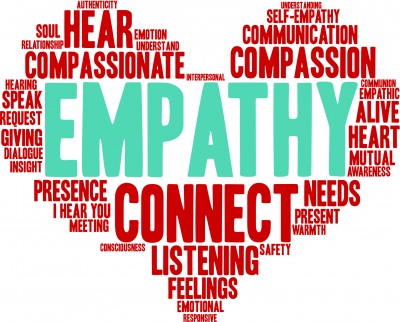 Dear, Honey, Hun, Sweetie, Buddy, Chief, That’s a good boy, Let’s go potty now. No, I am not talking to my 18-month-old, I am repeating terms of endearment and phrases I hear in memory care and assisted living every day. There is so much research behind the use of this type of language researchers refer to it as elderspeak. I know I am guilty of using terms like these and I know you are too but explore the impact it may be having on our residents.
Dear, Honey, Hun, Sweetie, Buddy, Chief, That’s a good boy, Let’s go potty now. No, I am not talking to my 18-month-old, I am repeating terms of endearment and phrases I hear in memory care and assisted living every day. There is so much research behind the use of this type of language researchers refer to it as elderspeak. I know I am guilty of using terms like these and I know you are too but explore the impact it may be having on our residents.
Although our intentions are generally well-meaning, communicating in such a way with a resident conveys a message of vulnerability, frailty, and inferiority. In fact, communicating with terms of endearment can be viewed as a caregiver trying to control or take charge of the situation rather than providing help and support to their resident. You may be thinking “this doesn’t matter to me, my resident has dementia, they won’t remember anyway”. And while it is true that your resident may have little to no short-term memory, they are capable of associating feelings with interactions. They will pick up on the tone of your voice and the inflections that you are using.
I feel it’s important to mention that not all residents will respond negatively to the use of elderspeak, but to keep things consistent for all our residents we should stop using terms of endearment, they can be viewed as belittling, condescending and can trigger negative behaviors. Did you know that using terms of endearment with a resident could lead to a state citation?
Let’s talk about some negative and positive examples:
When helping Ann, a pleasantly confused woman, after lunch the caregiver says “Sweetie” let’s go change your shirt, you spilled juice all over it, and then we will go potty, OK Annie?” The caregiver reaches out her hand to guide Ann to her room and says, “that’s a good girl, come this way” While the caregiver only means to help Ann and show that she cares for her the impact of her words could have a negative effect on how Ann will respond to the care she is about to receive. She may pull away from the caregiver and the caregiver will think that Annie is just being resistive when really Ann is feeling disrespected or confused.
The caregiver’s tone and language may remind Ann of a time when she was young, and her mother would call her Annie when she was caring for her, it could help to create feelings of a safe environment for “Annie”. OR depending on where Ann is at in her current reality it may trigger negative feelings. She could be reminded of a time after she was physically abused by her spouse when he would use terms of endearment to control or belittle her, maybe he only called her Annie after a nasty fight. OR consider this Ann was a high school principal and the use of a term like this offends her! She demanded that her students and staff respect her and the education she worked hard to achieve, and they called her Mrs. Brown, never Ann and most certainly never Annie!
The immediate impact of Elderspeak may not always be apparent and we must never assume that using a term of endearment is appropriate. Always call a resident by their proper name and if they have a title like Dr. or Professor until you have gained permission to call them by another name. If they have a nickname that they prefer to be called it must be documented in their ISP. For example, John has been called Bub his entire adult life, this is ok! If fact Bub might respond negatively to be calling John.
Research has shown there are 3 main factors on a caregiver use of Elderspeak.
- Familiarity with the resident- The more comfortable we are with the resident the more likely we are to use elderspeak.
- Whether the resident has dementia- the level of dementia plays a huge role in our use of elderspeak, the further progressed the dementia is the more likely we are to use a term of endearment. Maybe we view the resident as helpless or frail and in our effort to show or convey caring we may use elderspeak.
- If the resident is alone with the caregiver or if there are others present during the interaction. In the presence of family, other residents, or other caregivers we are less likely to use elderspeak, maybe because deep down we know it is disrespectful and we are more aware of what others would think if we used endearing terms.
So, have you ever caught yourself addressing a resident with Elderspeak? I know I have. And the only way we can change this behavior is to be aware of it then stop it.
My challenge to you is to be more aware of not only your communication methods but of those around you. Maybe you need to remind a co-worker, in private that they shouldn’t use endearing terms. Or you may need to be reminded yourself on occasion. After you catch yourself using elderspeak you may need to apologize to your resident when you call her Sweetie and correct your actions by using her preferred name. I challenge each of you to focus on the strengths of your residents and not their inabilities or weaknesses. Remember that everyone has value and should be treated in a respectful way.
Emmy Kaczmarksi, RN is a Master Trainer for AGE-u-cate® Training Institute, Dementia Educator, Behavioral Specialist, and works at White Pine Senior Living in Hudson, WI.
 Having just returned from Australia, I’ll be devoting several upcoming blogs to my research and fact finding with how Australia is advancing in aging and dementia care, as well as dementia and age friendly best practices. I found their award wages for aged care workers to be one significant difference from the US and worthy of discussion.
Having just returned from Australia, I’ll be devoting several upcoming blogs to my research and fact finding with how Australia is advancing in aging and dementia care, as well as dementia and age friendly best practices. I found their award wages for aged care workers to be one significant difference from the US and worthy of discussion. I have always been a proponent that if something is just not working well, shifting gears may be a solution. Let’s face it – everything is changing fast these days, so much so that it seems as if technology leads the pack in shifting gears at every juncture of our daily lives.
I have always been a proponent that if something is just not working well, shifting gears may be a solution. Let’s face it – everything is changing fast these days, so much so that it seems as if technology leads the pack in shifting gears at every juncture of our daily lives. Neurological research substantiates that human beings appear to be “wired” to be empathetic. In other words, we all have an innate ability to be empathetic. Would empathy training in dementia care provide a strong foundation tool for front line staff to help improve the quality of life for those living with dementia?
Neurological research substantiates that human beings appear to be “wired” to be empathetic. In other words, we all have an innate ability to be empathetic. Would empathy training in dementia care provide a strong foundation tool for front line staff to help improve the quality of life for those living with dementia?